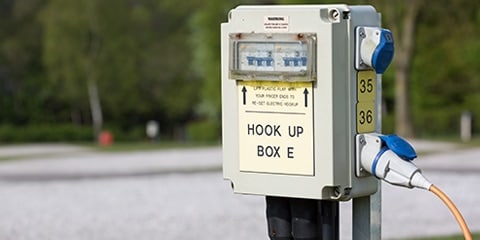Driving your EV to your holiday destination should be an exciting, carefree experience and you certainly do not want to be feeling anxious about where you can get your next charge. Whether you are driving a plug-in hybrid (PHEV) or a BEV (Battery Electric Vehicle) with or without a caravan, the reassurance of being able to charge up at your holiday destination is a comforting one.
If you are holidaying in the UK and heading to a campsite, caravan or holiday park, then be aware that some holiday park and caravan park owners have told the government that they won’t be able to handle the increasing number of Electric Vehicles. One owner of a holiday park in Somerset has only 3 rapid charging stations on a site that accommodates a thousand static caravans. The owner has been informed that their site will currently only be able to handle a small number of additional charging points, limiting the number of EV’s that will be able to charge up on-site at the same time.
Another site owner based in Dorset likens the problem with EV chargers to the struggle with rural broadband. Due to the low residential population, Dorset and Somerset were excluded from high speed internet networks for years and now the local grid capacity is limiting electricity supply to some rural areas.
However, there are some areas that are experiencing progress. A government programme to upgrade the infrastructure for charging EV’s has been awarded £1 million to Dorset and as soon as the local EV charging infrastructure improves in other areas, there will be less of a requirement for holiday parks to offer on-site charging points.
The Caravan Club has sought to address the issue in an another way. They have stated that as well as endeavouring to providing 2 rapid charging stations per site, they will also allow their customers to charge from their own power points using a portable charger (also known as granny/mode 2 charger) for an additional cost of £9 a day.
Tips for charging while away
If your caravan site or holiday accommodation hasn’t provided any means for EV charging there are strategies you can turn to that will help to ensure a healthy EV battery if you are reliant on a full charge.
Charge up en-route. Charging up at Rapid Charging Station a few miles away from your destination could provide enough milage while you’re out and about on holiday. You can use ZapMap or PlugShare to find Charging Stations on the way.
Use a Portable Charger. Granny/Mode 2 chargers are great if you want to plug in at a domestic socket, but you can also get portable chargers that have CEE plugs which are ideal for the hookups that are provided at camping and caravan sites, these portable chargers can charge at rates from 10 to 32 amps and can even come with a UK plug too. For more information look at our charger which comes with the 1 Phase 16A and 32A CEE chargers, which are the most common CEE sockets used for hookups at camping sites and caravan parks. However before you use a portable charger, always ask the accommodation owner if you can plug in your vehicle.
Look out for charging stations near attractions/restaurants. There are more and more charging points appearing in Supermarket car parks, villages and tourist attractions in the UK, so if you find one but there doesn’t seem to be anything interesting near by take a closer look, there could be a restaurant or interesting historical feature for you to enjoy while your vehicle is charging.
EV chargers at private hotels. More hotels are installing charging stations/Wallboxes and billing their customers to use the facility. Some hotels will open this up to public use depending on availability. More information about such sites can be found on Apps such as ZapMap and PlugShare.
© 2023. Please do not reproduce without our permission



